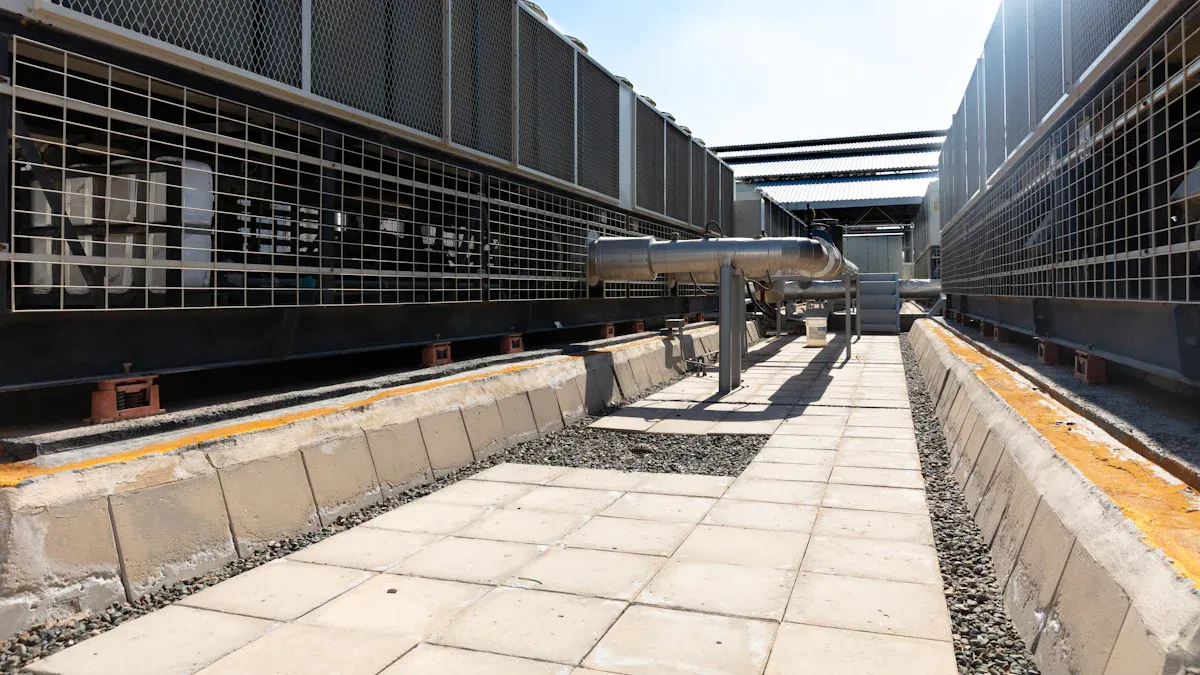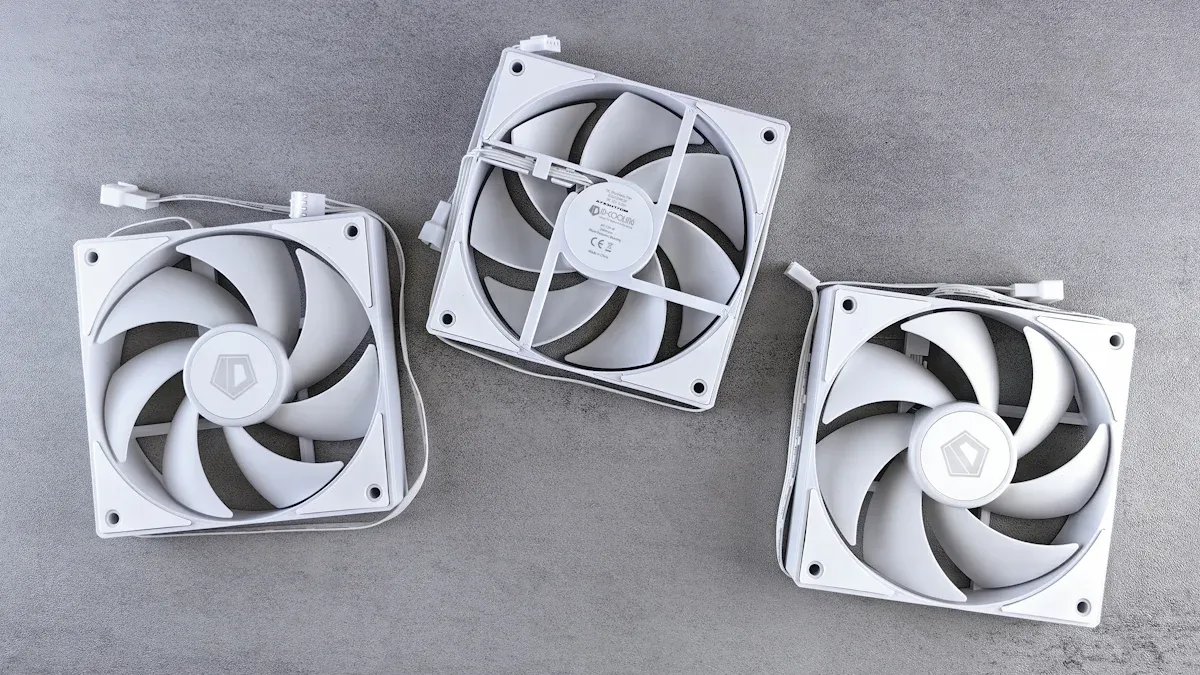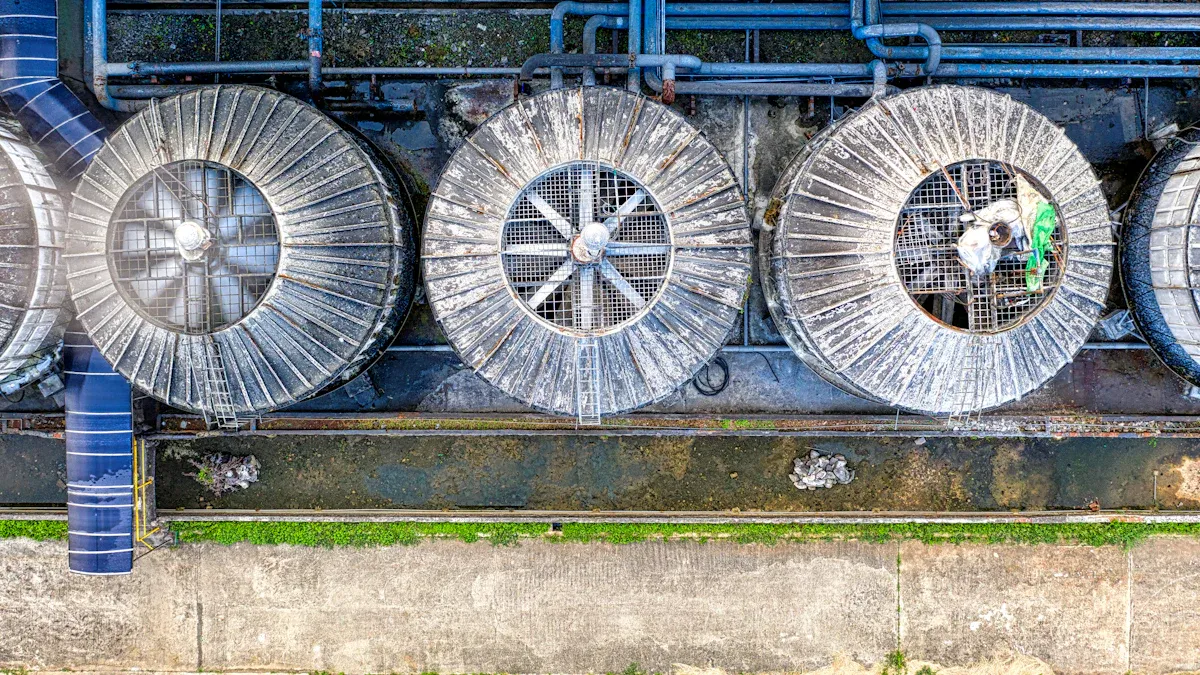
Selecting the right cooling machine importer involves evaluating several critical factors. Product quality ensures machines meet operational demands. Cost-effectiveness balances affordability with performance. Supplier reliability guarantees consistent deliveries and strong partnerships. Compliance with regulations ensures adherence to Russian import laws. After-sales support, including maintenance and spare parts, enhances long-term value.
Russia’s top import partners highlight the importance of these B2B criteria:
- Imports from China: US$ 72,693 million (24.77% share)
- Imports from Germany: US$ 27,351 million (9.32% share)
- Imports from the United States: US$ 17,265 million (5.88% share)
- Imports from Belarus: US$ 15,636 million (5.33% share)
- Imports from Korea, Rep.: US$ 12,987 million (4.42% share)
An effective importer checklist incorporates these elements to ensure successful partnerships and optimal performance.
Key Takeaways
- Focus on good quality by picking cooling machines that last long, work well, and are safe. Look for certifications like ISO 9001:2015 to trust the product.
- Choose machines that save energy and lower running costs. Pick ones that need less fixing to save money over time.
- Make sure suppliers are dependable by checking if they deliver on time and communicate clearly. Trustworthy suppliers help things run smoothly and build good relationships.
Product Quality

High Standards for Cooling Machines
Cooling machines must meet stringent quality benchmarks to ensure optimal performance and durability. Importers prioritize machines with robust objective characteristics, such as durability, compatibility, and security. Supporting services, including maintenance and technical assistance, further enhance product value. Skilled labor and advanced production processes also play a pivotal role in maintaining high standards.
| Dimension of Product Quality | Description |
|---|---|
| Objective Characteristics | Includes durability, compatibility, security, and supporting services, which are crucial for quality. |
| Technology Upgrading | Improvement in technology and production processes enhances product quality. |
| Employee Skills | Skilled workers are essential for maintaining high-quality production through adherence to processes. |
| Intermediate Goods | High-quality intermediate goods are vital for improving overall product quality. |
| Temperature Impact | Adverse temperature shocks can negatively affect product quality through various channels. |
Certifications and Quality Assurance
Certifications validate the quality and reliability of cooling machines. ISO 9001:2015 certification, for instance, ensures compliance with international standards for design, production, and customer service. Industry-specific certifications, such as ACCA’s ANSI-approved standards, emphasize energy efficiency and occupant comfort. Programs like the AMCA Certified Ratings Program provide independent verification of performance claims, ensuring that products meet rigorous standards. These certifications instill confidence in importers and streamline the selection process.
Key Features in the Importer Checklist
Importers evaluate cooling machines based on a detailed checklist to ensure they meet operational needs. Key features include efficient cooling systems, proper drainage mechanisms to prevent contamination, and noise reduction capabilities. Machines that are permanently connected to a water supply and offer out-of-sight cooling are particularly valued. Additionally, regular maintenance practices, such as inspecting strainers and lubricating fan shaft bearings, are essential for long-term performance.
- Cost-effective and energy-efficient designs
- Systems that cool outside air and displace warm air
- Ducting capabilities for targeted cooling
- Automatic draining systems to mitigate water-related issues
By adhering to these criteria, importers can confidently select machines that align with their operational goals and regulatory requirements.
Cost-Effectiveness
Balancing Cost and Performance
Balancing cost and performance is a critical factor for importers when selecting cooling machines. Machines that deliver high efficiency without excessive costs often rank higher on the importer checklist. Different cooling technologies offer varying levels of efficiency and cost implications. For instance:
| Cooling Technology Type | Key Metrics | Cost Considerations |
|---|---|---|
| Wet Cooling Systems | Highest efficiency and output | Least expensive overall |
| Dry Cooling Systems | Lower efficiency | Higher costs impact output |
| Hybrid Cooling Systems | Combination benefits | Estimated costs based on wet and dry systems |
Wet cooling systems, known for their cost-effectiveness, often appeal to importers seeking optimal performance at a lower price point. Hybrid systems, while slightly more expensive, provide a balanced solution by combining the strengths of wet and dry systems.
Long-Term Value Considerations
Cooling machines represent a significant investment, making long-term value a priority for importers. Machines with energy-efficient designs and durable components reduce operational costs over time. Importers also value systems that require minimal maintenance and offer extended warranties. These features ensure reliability and lower the total cost of ownership. By focusing on long-term benefits, importers can maximize returns on their investments while maintaining operational efficiency.
Strategies for Competitive Pricing
Competitive pricing strategies play a pivotal role in attracting importers. Companies like JLG Industries have demonstrated the effectiveness of leveraging advanced pricing solutions. By adopting tools such as PTC’s Service Parts Pricing solution, they improved data accuracy and gained better visibility into supplier cost changes. Automating pricing for 80% of parts streamlined their operations and enhanced their market competitiveness. Importers benefit from such strategies, as they ensure fair pricing while maintaining product quality.
Supplier Reliability
Consistency in Deliveries
Reliable delivery schedules are vital for maintaining smooth operations in the cooling machine import sector. Importers prioritize suppliers who consistently meet delivery timelines, as delays can disrupt production and increase costs. Key performance metrics such as On-Time Delivery Rate (OTD) and On-Time and In-Full (OTIF) help measure delivery reliability.
- On-Time Delivery Rate (OTD): Tracks the percentage of orders delivered on schedule, ensuring operational efficiency.
- Lead Time Variability: High variability can cause inefficiencies; reducing this metric is essential for seamless supply chain management.
- On-Time and In-Full (OTIF): Monitors the percentage of orders delivered both on time and in full, meeting customer expectations effectively.
Inconsistent deliveries often lead to higher inventory costs due to the need for larger safety stocks. Reliable suppliers mitigate these risks, ensuring regular fulfillment of customer demand.
Reputation and Industry Track Record
A supplier’s reputation and track record significantly influence importer decisions. Importers assess sustainability metrics, compliance with environmental standards, and industry certifications to gauge reliability. The following table highlights key performance indicators (KPIs) used to evaluate supplier credibility:
| Sustainability KPI | Measurement Unit |
|---|---|
| CO2 emissions reduction | kt |
| Energy consumption | kWh |
| Noise pollution | decibels |
| Compliance with environmental standards | N/A |
| Number of suppliers audited | N/A |
Suppliers with strong reputations often secure exclusive contracts, contributing to competitive pricing and high-quality products. This reliability fosters long-term partnerships, a critical factor in the importer checklist.
Communication and Responsiveness
Effective communication and prompt responsiveness are hallmarks of reliable suppliers. Importers value suppliers who provide timely updates on order status, address concerns efficiently, and maintain transparency throughout the supply chain. Clear communication minimizes misunderstandings and ensures alignment on expectations. Responsive suppliers also adapt quickly to unforeseen challenges, reinforcing trust and reliability in their partnerships.
Compliance with Regulations
Adherence to Russian Import Laws
Strict adherence to Russian import laws is essential for ensuring smooth operations and avoiding legal complications. Importers must comply with regulations governing product labeling, serialization, and customs procedures. Recent updates to these laws highlight the dynamic nature of compliance requirements. For instance, Decree No. 1079 introduced amendments affecting crypto code issuance and labeling processes, while Law No. 206-FZ established rules for non-labeled products during transitional periods. The following table outlines key regulatory updates:
| Date | Update Description |
|---|---|
| August 16 | Decree No. 1079 has become law, implementing amendments to Decree No. 1556, affecting processes for crypto code issuance, importation, and labeling at customs. |
| July 26 | Law No. 206-FZ empowers the government to regulate non-labeled and non-serialized products during the transition period, with formal rules for unmarked medicines importation. |
| July 5 | New marking law and Decree No. 955 provide options for stakeholders to request additional time for serialization and marking of medicines before the compliance deadline. |
| June 7 | State Duma deputies reviewed industry requests for flexibility in enforcing Federal Law No. 425-FZ, proposing a transition period to aid compliance. |
By staying informed about these updates, importers can ensure compliance and maintain uninterrupted supply chains.
Environmental and Safety Standards
Environmental and safety standards play a critical role in the selection of cooling machines. Importers prioritize suppliers who meet stringent requirements for energy efficiency, emissions reduction, and workplace safety. Compliance with these standards not only ensures regulatory approval but also aligns with global sustainability goals. For example, cooling machines with low noise levels and reduced CO2 emissions are highly valued. Suppliers who demonstrate a commitment to these principles often gain a competitive edge in the market.
Required Documentation and Certifications
Proper documentation and certifications are non-negotiable for importing cooling machines into Russia. Importers must provide detailed invoices, certificates of origin, and product specifications to meet customs requirements. Certifications such as ISO 9001:2015 and CE marking validate product quality and safety, streamlining the approval process. Including these elements in the importer checklist ensures compliance and facilitates smoother transactions.
After-Sales Support

Maintenance and Repair Services
Effective maintenance and repair services are critical for ensuring the efficiency and longevity of cooling machines. Regular upkeep prevents equipment overheating, which can lead to costly failures. Routine inspections and cleaning maintain optimal performance, while timely replacement of worn-out components extends the lifespan of cooling systems.
| Evidence Type | Description |
|---|---|
| Equipment Overheating Prevention | Regular maintenance is essential to prevent overheating and costly failures. |
| Importance of Inspections | Routine inspections and cleaning are vital for maintaining optimal performance. |
| Longevity of Cooling Systems | Timely replacement of worn-out components extends the lifespan of systems. |
Importers value suppliers who offer comprehensive maintenance packages, including scheduled servicing and emergency repairs. These services minimize downtime and ensure uninterrupted operations, making them a key factor in supplier selection.
Availability of Spare Parts
The availability of spare parts plays a pivotal role in maintaining the functionality of cooling machines. Importers prioritize suppliers who maintain a robust inventory of essential components. This ensures quick replacements and reduces the risk of prolonged downtime.
Suppliers with efficient logistics systems and well-stocked warehouses gain a competitive edge. They can promptly fulfill part requests, even during peak demand periods. Importers also appreciate suppliers who provide detailed catalogs and online platforms for easy part identification and ordering. This level of accessibility enhances operational efficiency and strengthens supplier-importer relationships.
Customer Service and Technical Assistance
Exceptional customer service and technical assistance are indispensable in the cooling machine industry. Importers seek suppliers who offer prompt and knowledgeable support to address technical issues and operational queries.
- A heat pump satisfaction survey by Eversource revealed high customer satisfaction with installation processes and product performance.
- Incentives through programs like Mass Save positively influenced customer decisions to adopt cooling technologies.
- A record number of residential customers switched to heat pumps in 2023, reflecting overall satisfaction with industry services.
Suppliers who provide 24/7 support, detailed user manuals, and training sessions for operators stand out in the market. These services not only enhance user experience but also build trust and loyalty among importers.
The five selection criteria—product quality, cost-effectiveness, supplier reliability, compliance, and after-sales support—are essential for successful importer-supplier partnerships. Suppliers can align with Russian importer expectations by adopting best practices:
| Practice | Description |
|---|---|
| Data Centralization | Streamlines material data and documentation for compliance. |
| Supplier Verification | Ensures producers meet ethical and regulatory standards. |
| Education & Alignment | Provides training on compliance requirements to meet documentation needs. |
| Risk Management | Maintains detailed records to mitigate risks from high-risk producers. |
| Transparency Efforts | Enhances trust by mirroring transparency initiatives for conflict minerals. |
By implementing these strategies, suppliers can build trust, ensure compliance, and foster long-term partnerships with Russian importers.
FAQ
What certifications are essential for cooling machine importers in Russia?
ISO 9001:2015 and CE marking are critical. These certifications validate product quality, safety, and compliance with international and Russian standards.
How can suppliers ensure long-term partnerships with Russian importers?
Suppliers should focus on consistent deliveries, transparent communication, and compliance with regulations. Offering robust after-sales support also strengthens importer relationships.
Why is after-sales support crucial for cooling machines?
After-sales support ensures operational efficiency and reduces downtime. Services like maintenance, spare parts availability, and technical assistance enhance machine longevity and performance.
Post time: Apr-07-2025





